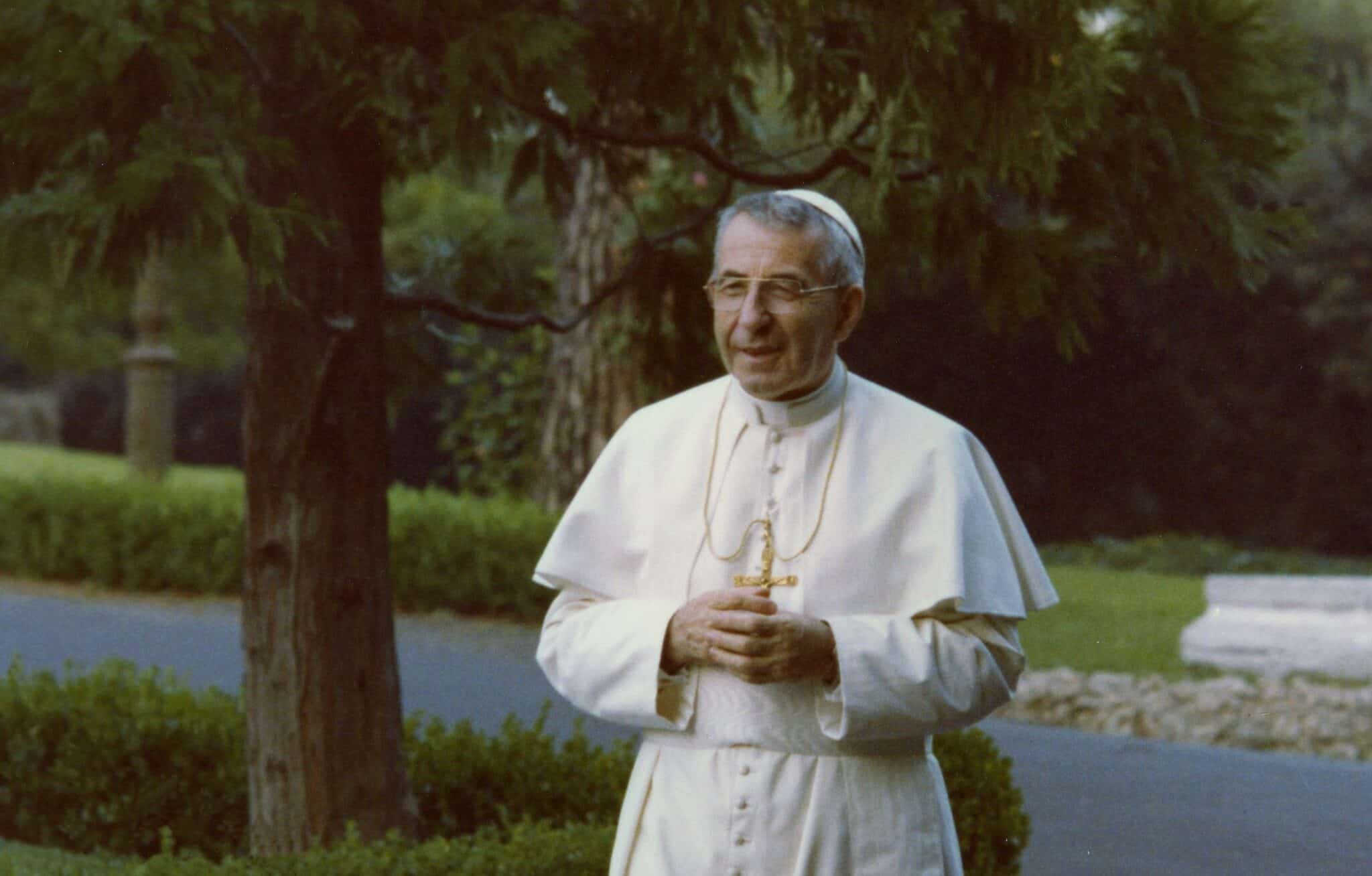Though brief, Pope John Paul I’s papacy had a far-reaching influence on future Church leaders.
More than three decades have elapsed since he departed so abruptly. Somehow I still see him vividly, still hear the tenor of his voice as crisply as on that August day in 1978 when I first glimpsed his radiant smile. For the hundreds of millions around the globe whose hearts he touched and whose lives he inspired with hope, Albino Luciani is an impossible man to forget.
Before August 26 of that year, he had been a relatively obscure figure, as he desired. That all changed when, in one of the quickest conclaves in history—two days—he emerged as Pope John Paul I. His election was as unexpected as it was swift.
Prospective popes are known as papabili. Few of the major news outlets considered Luciani one of them. When a reporter surprisingly asked the reticent patriarch of Venice about his chances of becoming pope, he insisted that he ranked far down on the “C list” of candidates—“out of danger,” as he wrote to his niece Pia. “You can’t make gnocchi out of this dough!” the cardinal added good-naturedly.
Luciani, however, was unaware that the influential Cardinal Giovanni Benelli, known as the “Grand Elector,” was discreetly promoting him among the conclave participants as the ideal pastoral pope they sought. Benelli knew the essence of the man whose cause he championed. Despite Luciani’s steady rise in the Church hierarchy, he had always considered himself a simple priest and catechist who lived a spartan existence.
Born to a Resilient, Faithful Family
Throughout his career as a prelate, Luciani believed the Church should be devoted to the poor. It was a conviction deeply rooted in his childhood. When his father, a manual laborer, gave his son permission to enter the seminary, he advised Albino never to forget those who toiled under wretched and often perilous conditions simply to scratch out a subsistence living for their families. The lesson was seared in the son’s memory.
Albino knew from personal experience of what his father spoke. He was born and raised in a remote village in northeastern Italy now known as Canale d’Agordo. Like most of its neighbors, the Luciani family was intimately familiar with the daily sting of poverty.
Nevertheless, Bortola, the matriarch, maintained an unshakable faith. The children were devout and happy despite their meager meals, tattered clothes, and the chronic absence of their father, who could only find work abroad.
The simple community was dominated by the Church of San Giovanni Battista. During the celebration of most Masses, the sun-struck stained-glass windows splashed their dazzling colors within the grand edifice while the dulcet sounds of its mighty organ resounded within its walls. By his own admission, young Albino was entranced as he entered this wondrous new realm where his deprivation temporarily vanished, and his devotion flourished. It is no wonder that his calling to the priesthood came so early in life.
Both as a student and then as a teacher at the Gregorian Seminary in Belluno, Luciani earned a reputation for unfailing honesty, selflessness, gentleness, and generosity. Much later, in an encounter with Cardinal Giovanni Roncalli, later Pope John XXIII, “Don Albino” impressed him with his keen intelligence and profound humility. Good Pope John held Luciani in such esteem that some years afterward he insisted on personally consecrating him bishop at St. Peter’s Basilica. He also recognized Luciani’s potential for greater service to the Church in the future. The pope presciently confided to a monsignor, “Watch that little bishop, you will see.”
On to Venice
The faithful of Vittorio Veneto loved Luciani for his accessibility, hopefulness, and meekness. Upon taking possession of his diocese, he readily confessed, “I am the little one of once upon a time; I am the one who comes from the fields. I am pure and simple dust, and on this dust the Lord has written the episcopal dignity of the illustrious Diocese of Vittorio Veneto.”
He made a solemn promise at his installation, “I desire only to enter into your service and to put at your disposal all my poor strength, the little I have, and the little I am.” His episcopal motto was “Humilitas,” the very virtue that defined him as a man, priest, and pope.
More than a decade later, as he was leaving Vittorio Veneto for a new assignment, his flock presented him with a parting gift of some one million lire they had collected from the diocesan faithful. Luciani thanked them for their kindness but convinced them to donate the proceeds to charity instead. He left for Venice with little money and few possessions.

The flamboyant Venetians prided themselves on a centuries-long tradition of welcoming every new patriarch with incomparable pomp, but Luciani never felt comfortable with lavish ceremony. Insisting on a simple arrival, he quickly alienated the city’s leaders, who were insulted at his rejection of their opulent rituals and considered his unadorned comments at St. Mark’s Basilica unworthy of his prominent status.
The relationship did not improve with the passage of time as the patriarch declined virtually all social invitations from distinguished Venetians unless their purpose was to raise money for the downtrodden. Instead, he devoted his time to encouraging the sick, relieving the loneliness of the elderly with personal visits, and comforting the homeless and the neglected in the city’s alleys.
A Humble Shepherd
Pope Paul VI recognized the saintliness of the man who walked the streets of Venice wearing a simple black cassock. In 1972, the pope visited the patriarch. Before a crowd of 20,000, Paul placed his papal stole on Luciani’s shoulders, a cause of acute embarrassment to the diffident bishop.
Six years later, upon his election to the chair of St. Peter, Luciani startled the College of Cardinals by exclaiming, “May God forgive you for what you have done.” Many electors worried that he would decline the office. Despite his personal misgivings, however, Luciani felt obliged to accept.
Moments after his election, he broke with precedent by choosing the first double name in Church history in honor of his two immediate predecessors. He then directed the cardinals to remain sequestered in the Sistine Chapel until the following day. It was an unpopular decision, for as Genoa’s Cardinal Giuseppe Siri noted, “The place is like a tomb” from which the cardinals were eager to escape.
Despite the murmurs of discontent, Luciani kept his wry sense of humor. When a cardinal suffering from nicotine withdrawal asked the pope permission to light up, John Paul I agreed, “so long as it’s white smoke!” Even as pope, he regarded himself as “a poor man accustomed to small things and silence.” Consistent with that self-image, he initiated a series of changes that distressed many traditionalists in the high echelons of the Vatican.
Despite the brevity of Luciani’s pontificate—a meager 33 days—he transformed the papacy from a regal office to one characterized by the simplicity of the Good Shepherd.
This meek man boldly shattered many time-honored Church traditions, especially by discarding the monarchical trappings of the office. The day following his election, for instance, John Paul delivered his first Angelus, a charming, spontaneous talk in which he used the first-person singular pronoun “io” (I) instead of the royal “we” of papal custom. His unscripted remarks were informal, self-effacing, and noticeably free from editing by Vatican speechwriters.
Gianpaolo, as the Italians fondly called him, detested the portable throne known as the sedia gestatoria. He reluctantly relented to its use when pilgrims gathering for his general audiences complained they could not see the diminutive figure as he approached the stage.
At his formal installation, the new pontiff banished the ostentatious papal tiara, opting instead for donning a simple lamb’s wool pallium, the symbol of his status as bishop of Rome. He unfailingly wowed the crowds with his infectious grin, “il sorriso di dio” the Italians called it—“the smile of God.” (One Vatican official joked that Luciani smiled more in five minutes than Pope Paul VI had in 15 years!)
John Paul’s Wednesday general audiences drew such multitudes that two sessions were held to accommodate all. The pope spoke simply but passionately about Christian virtues. He would call a youngster to the stage “to help the pope” get his message across to the adults. The exchange between them inevitably delighted the audiences.

Msgr. John Magee, the only man in the two millennia of Church history to serve as personal secretary to three popes, told me that Luciani’s was a pontificate fulfilled because of his indelible imprint on the office. Beyond that, the first John Paul inspired people of various faiths and even the faithless to strive to lead ethical lives. Patti Smith, the rebellious punk rocker, was so enthralled that she dedicated an album to Luciani.
‘He Passed as a Meteor’
At his last general audience on the day before he died, John Paul spoke movingly about love. As he was talking, a man interrupted the pope in a booming voice, wishing him a long life. John Paul put up his hands as if to dismiss the sentiment saying softly, “OK,” before glancing somberly at his hands that he had neatly folded in his lap. It was as if he had a premonition of his imminent death. The next night before retiring to his bedroom, John Paul, as was his custom, visited the sisters in the kitchen to thank them for preparing dinner. To them he uttered his final words, “A domani se dio vuole,” which means “Until tomorrow, God willing.”
Earlier that day, the pontiff had complained of chest pains, and Don Diego Lorenzi, the personal secretary he had brought with him from Venice, asked if he should call the doctor. The pope demurred. Sister Vincenza, his longtime housekeeper, had medicine that would relieve the symptoms, he assured Lorenzi. The next morning, as part of her daily routine, Vincenza left coffee on a table outside the pope’s bedroom door around 4:30 a.m. When she later returned to retrieve it, she noticed it was untouched. Since Luciani had never before overslept, Vincenza grew alarmed. She knocked on his door, and when there was no answer, she opened it a crack only to discover the pope’s lifeless body propped up in bed.
In a panic, she summoned Magee who quickly dressed and darted to the papal bedchamber. He immediately called Cardinal Jean Villot, the secretary of state, with the shocking news. Concerned that a scandal would erupt if the public became aware that a nun had been in the pope’s bedroom, Villot concocted a story for the press that Magee had found the body. He also insisted that the pope had been reading The Imitation of Christ at the time of his death, when he had actually been reviewing some old homilies. When the truth became public, sinister rumors swiftly circulated. A quick embalming that precluded an autopsy provided further credence to the growing speculation that the pope had been poisoned.
The reality, however, was that John Paul I had not been in robust health. He had been taking medication for circulatory problems. His doctor back home had instructed him to walk daily to alleviate the pain of his swollen ankles. Additionally, Luciani had suffered an embolism in 1975. The official cause of death, according to the Vatican physician, was myocardial infarction—a heart attack.
A priest from Belluno, Silvio Dinard, whose family knew Luciani, has no doubt that the pope died of natural causes. His father, he told me, learned from a member of the Luciani clan that in a two-year period, five cousins died of the same disease. Close family members also dismissed foul play. That, however, did not discourage conspiracy theorists from publishing books (some selling in the millions) insisting that the pope had been murdered.
Notwithstanding the preponderance of evidence to the contrary, the conspiracy theories persist in abundance to this day. Not surprisingly, the world was shocked and bereaved when learning of his death. In a mere month, Papa Luciani had captured hearts and souls by providing a glimpse of God’s love and mercy in the form of a man who was goodness personified. Distraught mourners felt a fathomless emptiness, a piercing grief at his sudden passing. Luciani’s funeral Mass was held outdoors, despite a drenching rain, a sea of black umbrellas shrouding the assembled masses in the vast piazza.
It was, some observed, as if the very heavens were weeping. But at the exact moment the coffin was carried into St. Peter’s for burial in the grottoes below, a rainbow suddenly materialized in all its majestic glory. “He passed as a meteor which unexpectedly lights up the heavens and then disappears, leaving us amazed and astonished,” Cardinal Carlo Confalonieri aptly observed in his funeral homily.
I was one of those left amazed. At the time of Luciani’s papal election, I was a 26-yearold lapsed Catholic, my life adrift, who found myself mysteriously mesmerized by this entrancing clergyman. In subsequent years, his treasured memory and living words gradually rekindled my faith. I would later retrace the arc of his life during an extended stay in Italy. There I interviewed most of his closest family members, friends, and associates. I combed through archives and read about him extensively in both English and Italian so that I could tell his inspiring life story to those who never knew of him.
It is a tale of faith, hope, and charity personified by a self-described “little man,” who, through his saintliness, reminded us that a benevolent and merciful God still watches over this broken world. People of all times have yearned for this message of hope as well as a stellar example of how to live a good life.
Providentially, Pope Luciani’s life lessons continue to be shared in word and deed by Pope Francis.








